Smartphone use hitting struggling pupils hardest, major study finds
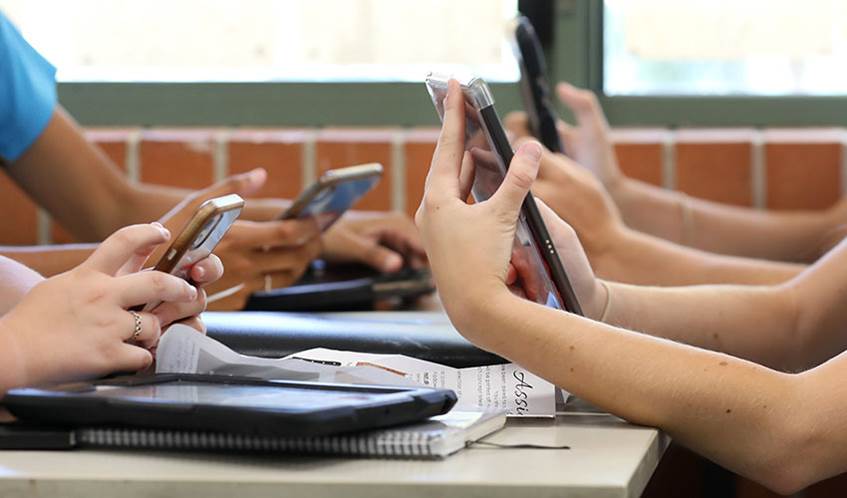
- Parents underestimate the types of harmful content their children are accessing
- Teachers and parents broadly support stricter school policy on smartphone use
- Most comprehensive study of its type on smartphone use among young people
Young people struggling with their studies at school are much more likely to have negative experiences on their smartphones than their better performing peers, a major new study has found.
Research on the use of smartphones among young people found that pupils who categorised themselves as ‘struggling’ academically were far more likely to report negative experiences with their devices than students who described themselves as ‘coasting’ or ‘thriving’.
Academics from UWE Bristol who conducted the study found that struggling pupils were particularly likely to encounter more negative experiences involving eating disorder content, self-harm/suicide content and upsetting text messages in online chat groups than other pupils.
The link was discovered in the study – the most comprehensive of its type – gathering the views of pupils, parents and teachers on the use of smartphones among young people. In all, the survey gathered the views of 3,721 secondary school pupils, 1,595 parents and 352 secondary teachers across schools in inner city, suburban and rural settings in and around Bristol.
Academics Dr Ben Knight and Dr Paul Redford, from UWE Bristol’s School of Education and Childhood, worked closely in collaboration with six secondary schools on this unique study which captured robust data from three groups simultaneously to aid the debate around school policy on smartphones.
Dr Knight, a Senior Lecturer in Education, said: “The young people who report they are struggling are experiencing higher rates, and in some cases significantly higher rates, of negative experiences than the pupils who report that they're coasting or thriving. They are also reporting significantly lower rates of positive experiences with their smartphones than their peers who report that they are coasting or thriving.
“We can quite confidently speculate that a good number of the young people in this ‘struggling’ cohort will be experiencing cumulative and intersecting forms of ‘struggle’. It may not be a surprise therefore, that they report higher degrees of challenge associated with their smartphone and social media use. In this context, we see this cohort as being particularly vulnerable to the most troubling dimensions of smartphone use.”
Dr Redford, an Associate Professor, added: “From our study, chat groups such as those on WhatsApp seem to be the most toxic element of smartphone use. Traditional ways in which young people bug one another are amplified in these online groups. Pupils, parents and teachers all pointed their fingers at chat groups as the cause of the most negative experiences. Overall, between one tenth and one quarter of the pupils we surveyed reported having a wide range of negative experiences with their smartphones, from everyday upset arising from peer group squabbles to exposure to harmful and illegal content.”
The survey also unearthed a disconnect between the concerns of parents over smartphone use and the types of negative experiences on smartphones actually reported by young people.
"From our study, chat groups such as those on WhatsApp seem to be the most toxic element of smartphone use. Traditional ways in which young people bug one another are amplified in these online groups."
Dr Paul Redford, an associate professor in the School of Education and Childhood
In their survey responses, parents overestimated the problems their children were experiencing around being upset, ignored or left out, having problems with sleep, receiving nasty messages or causing drama with their friends. However, they underestimated the extent to which their children were having negative experiences such as accessing suicide/self harm content, eating disorder content, disturbing content and illegal content, and being contacted by strangers.
Dr Knight said: “Parents are far more likely to report higher rates of fairly low level negative experiences, like falling out with friends and things like that. But they're far more likely to report much lower rates than the students of the more serious experiences like seeing illegal content adult content - suicide ideation, self harm, eating disorders, and those types of things.
“We speculate that that is probably largely an indicator of what the young people are and are not sharing with their parents. And of course, we've noted that there's a great deal more at stake for the young people than there is for the parents. They could be thinking ‘If my parents or teachers were aware of the extent to which I'm seeing certain content, then maybe they take my phone away’.”
Dr Redford added: “The overall picture is that there are much more serious negative things going on with young people and their smartphones than parents are aware of. But what also came through from the survey is that pupils are happy to talk to the parents about some of the things they are experiencing on their smartphones. There needs to be further discussion around how we help young people and their parents navigate some of these things and have honest and open conversations about the challenges they face and not demonising smartphone use.martphones are not going to vanish magically from young people’s lives, so supporting and encouraging open conversations about them is crucial.”
More than 70 per cent of teachers surveyed witnessed tiredness in pupils due to smartphone use, 70 per cent witnessed conflict in school which started outside of school due to smartphones and 65 per cent witnessed bullying due to smartphone use. More than half of respondents also witnessed stress/anxiety and reduced peer interaction.
On school policy regarding smartphone use, the survey findings revealed a division between teachers and parents on one side, and young people on the other. Teachers and parents were broadly in support of stricter rules or keeping rules the same, while pupils wanted more leniency.
Current policy on phones in most secondary schools is for devices to be switched off and kept in pupils’ bags, on the understanding that they will be confiscated if seen in use. Of the parents surveyed, half would prefer a stricter policy in some form (either no phones, brick phones only, phones handed in, or phones locked in pouches), with 42.7 per cent preferring the status quo. Among teachers, 64.7 per cent prefer some form of stricter policy while 33 per cent preferred the status quo.
Among pupils, only 6.5 per cent of pupils want some form of stricter control, while 30.2 per cent preferred the status quo and 57.5 per cent wanted the freedom to use their phones in school outside of lessons. Young people who classified themselves as ‘struggling’ with their studies in the survey were the group that expressed the clearest preference for more relaxed rules and were far more likely to oppose moves to introduce more restrictive policies.
Dr Knight said: “This finding highlights an interesting paradox: the young people who are telling us that they are struggling academically are also reporting increased negative experiences on their smartphones, yet they are also the group most resistant to having their phone use restricted.”
The survey also highlighted several positive aspects of smartphone use among young people. Safety and convenience was cited as a major benefit, with 64 per cent of parents responding that their child was safer on their commute to school with their phone and 80 per cent of child respondents saying they were safer with their phone. A majority of young people also reported having many positive experiences on their phones.
The study was conducted at a time when a number of secondary schools and academy trusts in Bristol announced they had either gone smartphone free or were planning to do so. The PAPAYA charity, working with the Smartphone Free Childhood Group and some head teachers in Bristol, have formed a city-wide smartphone and school policy taskforce with the aim of encouraging Bristol to become the UK’s first fully ‘smartphone free school city’.
Dr Knight said: “For both parents and young people, concerns about safety and convenience are a key driver of wanting to have their phones in school.
“Students who are thriving are happier with a more restrictive policy while students who are struggling are less likely to want a restrictive policy - this presents some interesting dilemmas for school leaders. Senior leadership teams will be wondering what they do, policy wise, with respect to their pupils. They have pupils at their schools now with their phones on them - there is a question over whether they are making policy for the young people they currently have or for future pupils. There are some complex decisions that need to be made.”
The full data from the study can be accessed on the project web page.
Related news
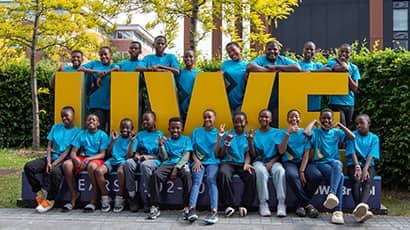
09 September 2025
Project Zulu choir celebrates another record-breaking tour
Nearly £37,000 was raised during three unforgettable weeks of the 2025 Project Zulu choir tour – setting a new fundraising record since the tour began.
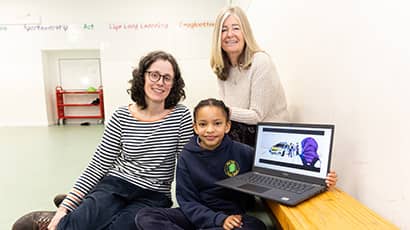
03 February 2025
Groundbreaking UWE Bristol project based on children’s lived experiences of racism in the UK set to transform police training
UWE Bristol researchers have worked with over 1,000 primary-aged children to explore everyday experiences of racism to inform future police training.

15 January 2025
Pupils’ work produced in anti-racism lessons to be displayed at Bristol Cathedral
Work produced by school children in response to specially designed lessons on anti-racism will go on show at an exhibition at Bristol Cathedral.

26 April 2024
New billboard to encourage conversations about what life might be like without racism
The billboard displays an illustration from the book ‘If Racism Vanished for a Day’, which explores the impact of racism on children's wellbeing.
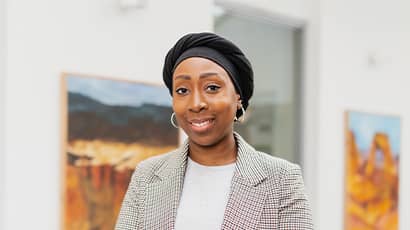
22 January 2024
New teaching resources to tackle under representation of Black British voices in the classroom
A new educational project, which aims to remove barriers to teaching Black British literature in schools, will be officially launched this month.

26 July 2022
Technology, education, sports and filmmaking students to volunteer in South African townships
Students from UWE Bristol are travelling to South Africa this summer to volunteer in township schools in KwaZulu-Natal Province.

20 February 2020
UWE Bristol study finds schoolchildren are receptive to eating insects as part of daily diet
A study by a researcher at UWE Bristol in collaboration with Bug Farm Foods reveals schoolchildren are open to eating insects as part of their school meals.
You may also be interested in

Media enquiries
Enquiries related to news releases and press and contacts for the media team.
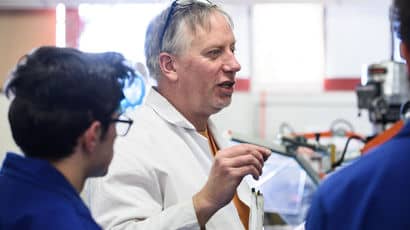
Find an expert
Media contacts are invited to check out the vast range of subjects where UWE Bristol can offer up expert commentary.

School of Education and Childhood
The School of Education and Childhood at UWE Bristol is a vibrant community committed to enhancing and transforming the lives of our students, and the children, young people and adults they work with.

Research
Our active, collaborative research community of bold, original thinkers break boundaries, immerse themselves in the now and open the way to new futures.






